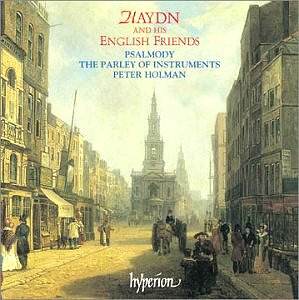HAYDN AND HIS ENGLISH FRIENDS
 Psalmody/Parley of
Instruments/Peter Holman
Psalmody/Parley of
Instruments/Peter Holman
 HYPERION CDA
67150
HYPERION CDA
67150
Crotchet
AmazonUK
AmazonUS

What art expresses (Haydn). Blest be the name of Jacob's God (Haydn).
Maker of all! be thou my guard (Haydn). O let me in th' accepted hour (Haydn).
Horrible is the end of th' unrighteous generation (John Stafford Smith).
Tell us O women (Charles Burney). The Emperor's Hymn: Poco Adagio from the
String Quartet in C major op.76 No.3 (Haydn). Give to God our thankful songs
(William Gardiner arr. Haydn). Where Lord shall my refuge see? (Samuel Webbe
senior). My God my king with joyful view (William Shield). Hear my prayer
O Lord (Johan Arnold Dahmen). O thou that dwellest in the highest heavens
(Johan Arnold Dahmen). Ye winged inhabitants of the grove (Johan Arnold Dahmen).
Long life shall Israel's king behold (Haydn). How oft instinct with warmth
divine (Haydn). The Lord th' almighty monarch spake (Haydn). The God of Gods
the Lord hath call'd (John Foster of High Green Yorkshire).
This is an issue of great historical interest and no little musical interest.
Haydn's visits to England and their musical products are mostly well documented
but one exception is his contribution - six psalm tunes, by no means unworthy
of his genius - to William Tattersall's Improved Psalmody of 1794,
a companion, surely, in its attempt to improve the music of church services,
to Dr. Miller of Doncaster's Psalms of David four years before. Others
besides Haydn contributed to this volume and here we have a beautiful example
from the elder Samuel Webbe and a sprightly one from William
Shield. John Stafford Smith, who composed the tune of The Star
Spangled Banner, also contributed to Improved Psalmody, but here he is
represented by an extended anthem possibly intended for a festival and certainly
worthy of one. Three sacred songs with string quartet accompaniment by Johan
Dahmen, a cellist in Salomon's orchestra, are also high in quality. Dr
Burney was a friend of Haydn, and he too appears in this disc with a
"dialogue hymn" - earlier than Haydn's visits but brightly galant. Another
Haydn friend, William Jackson of Leicester, arranged Haydn's
Emperor's Hymn Variations as a strophic anthem (Haydn's quartet original
is also included for comparison). John Foster of High Green (Sheffield),
another English composer for the church, clearly admired Haydn as can be
seen from his psalm setting here. Finally (actually first on the CD) is the
only piece which is not sacred : What Art Expresses, words, in praise
of Haydn, and tune by Henry Harington of Bath (credited by some with
the song Drink To Me Only), but set by Haydn himself: a memorable piece.
Performances, by the Parley of Instruments (string quartet and keyboard)
and Psalmody (lovely solo and choral singing) are excellent; so is Peter
Holman's scholarship.
Phil Scowcroft

